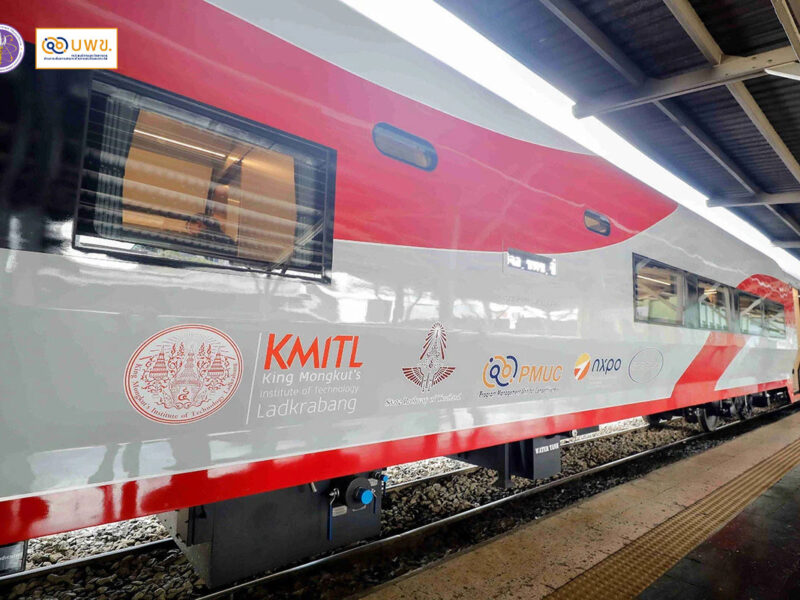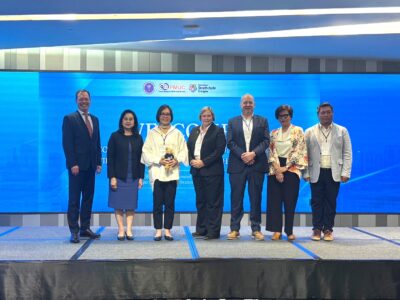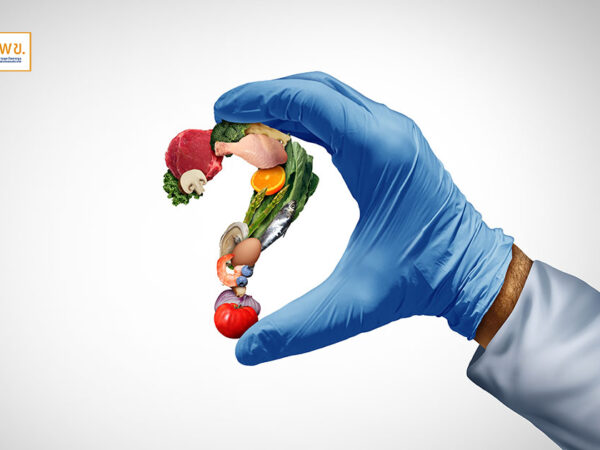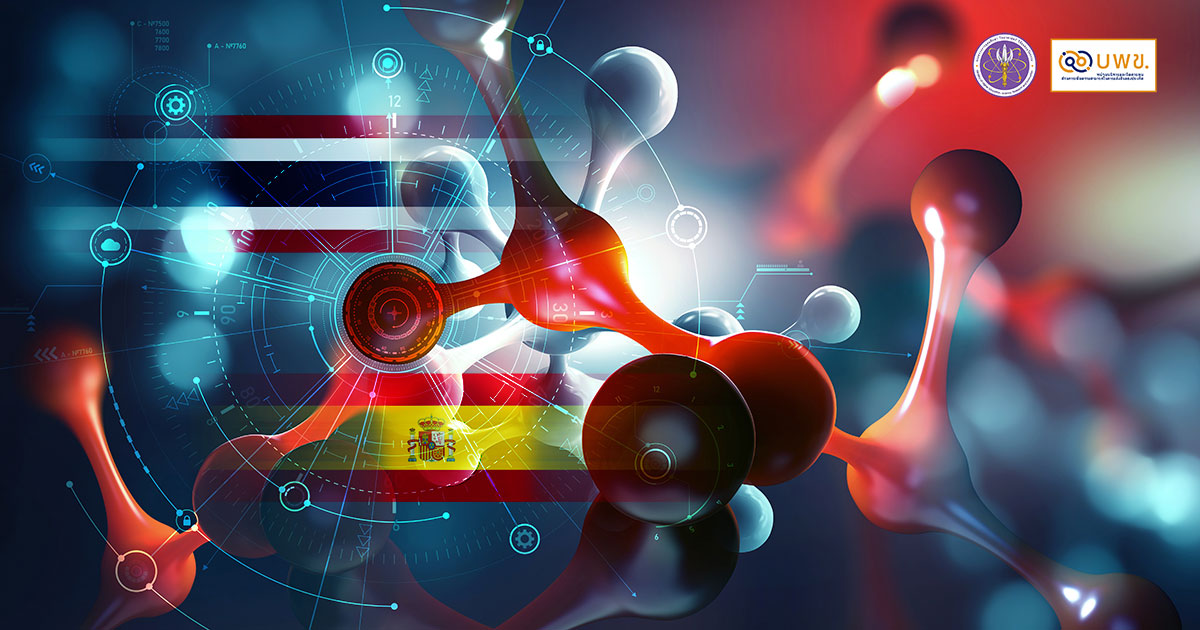
After the signing of a bilateral collaboration agreement under the Thailand-Spain Innovating Program (TLSIP) between the Program Management Unit for Competitiveness (PMUC) and the Centre for the Development of Industrial Technology (CDTI) under the Ministry of Science, Innovation, and Universities of Spain, which took place in November 2023, a new milestone has been reached.
The collaboration aims to elevate research and innovation partnerships, facilitate technology exchange, and support joint efforts between Thai and Spanish researchers and entrepreneurs in the areas of health-promoting foods with high nutritional value and innovations in turning agricultural food waste into value-added products, promoting sustainable health and well-being for citizens of both countries. Today, Thailand and Spain have taken the next step in expanding this continuous collaboration.
On this occasion, PMUC and CDTI will join forces to develop research and innovations in future nanotechnology for health and personalized medicine, aiming to enhance the well-being of the people in both nations. The Thailand-Spain Science and Technology Cooperation Conference gathered experts, researchers, and leaders in the fields of health and nanoscience from both countries to exchange knowledge on the latest technological trends, foster academic and innovation partnerships, and explore business opportunities through business matching activities.
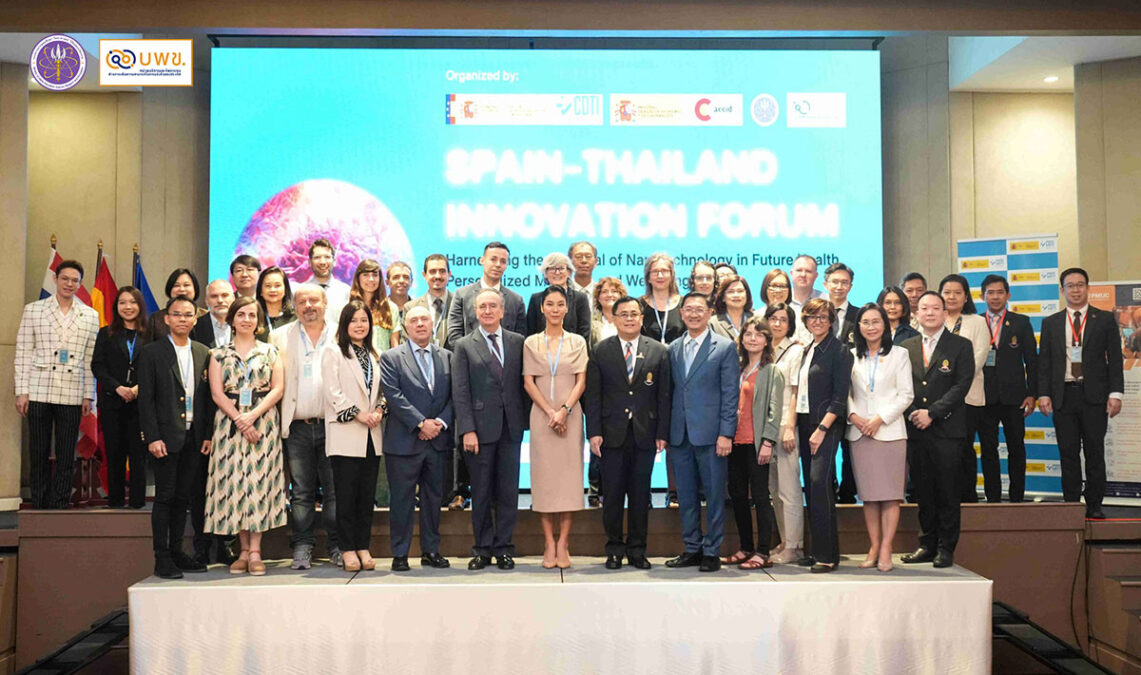
During the event, a panel discussion was held, featuring senior experts from the academic and business sectors of both countries, who exchanged their visions on the future of the healthcare industry and potential collaboration opportunities. The discussion highlighted the impact of nanotechnology on medical diagnostics and treatment, focusing on both the benefits and significant challenges.
In the afternoon, the event featured B2B (Business-to-Business) and R2B (Research-to-Business) activities, which served as a major highlight. This marked the first time that over 15 private companies and research institutes specializing in nanotechnology from Spain and Thailand were given the opportunity to present their Nano Medicine research and development projects through pitching sessions. The objective was to seek partners and funding to support business development, paving the way for collaboration in technology development, product innovation, and health and medical services between research centers and entrepreneurs from both countries. This is a key objective of the PMUC and CDTI in co-organizing this event.
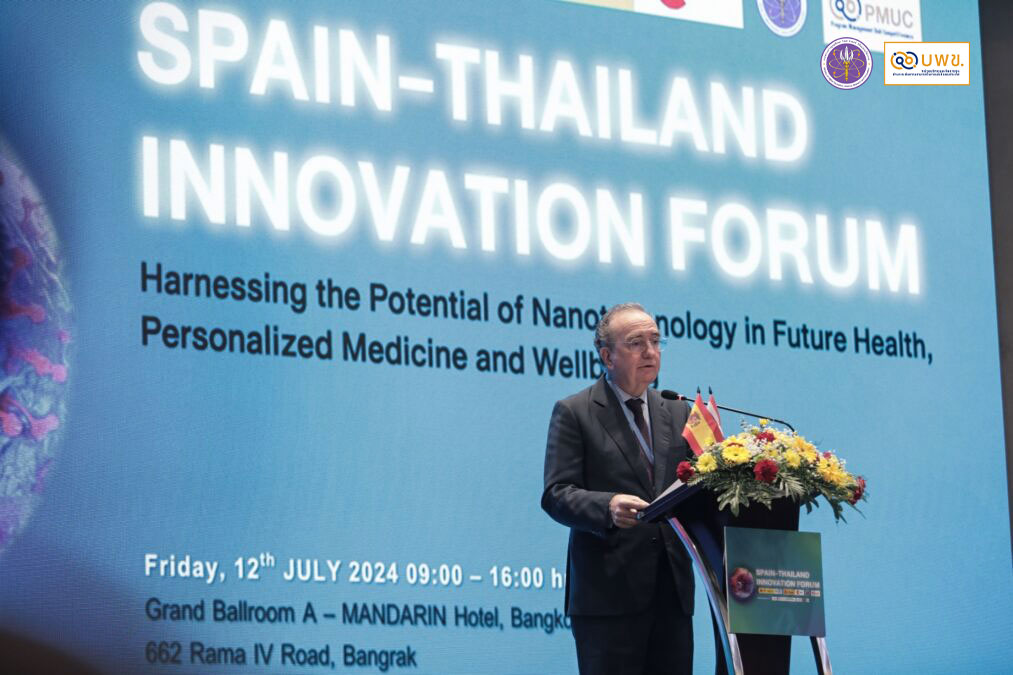
Felipe de la Morena Casado, Spanish Ambassador to Thailand.
CDTI and Spain are committed to advancing this partnership, connecting the strengths of 15 Thai and Spanish companies towards sustainable business development in medical nanotechnology.
At the opening ceremony of the Spain-Thailand Innovation Forum, held under the theme “Harnessing the Potential of Nanotechnology: Future Health, Personalized Medicine & Wellbeing” to promote the potential of future nanotechnology in health, personalized medicine, and well-being, the event took place at the Mandarin Hotel in Bangkok. It was presided over by Mr. Felipe de la Morena Casado, Spanish Ambassador to Thailand, and Ms. Suchada Tansup, Secretary to the Minister of Higher Education, Science, Research, and Innovation (MHESI). On this occasion, Mr. Felipe de la Morena Casado stated:
“This Thai-Spanish Scientific and Technological Cooperation Conference has brought together experts, researchers, and leaders in the fields of health and nanoscience from both countries to exchange knowledge and discuss the latest technological trends, establish academic and innovative collaborations, and explore mutual business opportunities.”
“Over the past two years, it has been a favorable period for Thailand and Spain to develop innovations and technologies together through the responsible agencies and ministries overseeing this area. Notably, the collaboration between the Program Management Unit for Competitiveness (PMUC) of Thailand and the Centre for the Development of Industrial Technology (CDTI) of Spain, both being national-level agencies responsible for innovation and technology development as well as promoting the business sector and entrepreneurs who produce various innovative products.”
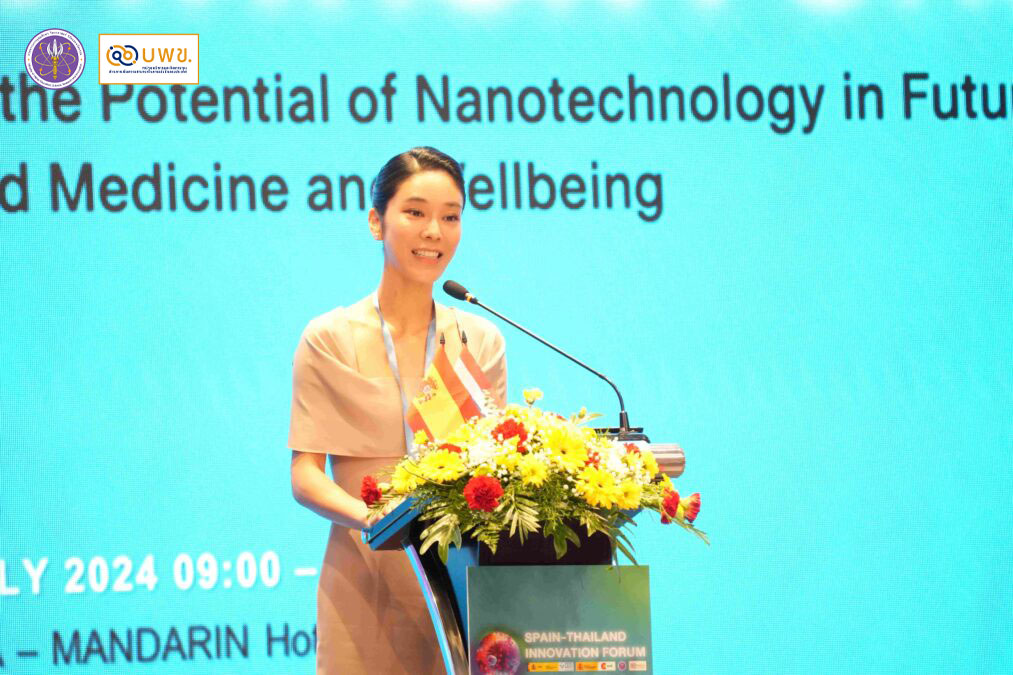
Suchada Tansup, Secretary to the Minister of Higher Education, Science, Research, and Innovation.
“This collaboration began in 2022, when Thailand and Spain signed a Letter of Intent for academic cooperation and devised a joint action plan for 2024-2026. By 2023, concrete cooperative projects and exchanges between the two countries emerged from the signing of a Memorandum of Understanding (MoU) to establish a joint funding mechanism, strengthening the innovation and technology partnership between Thailand and Spain in the field of food production technology aimed at developing new health-promoting rice varieties, involving the Rice Science Center of Kasetsart University, COPSEMAR company from Spain, and the ICTAN/CSIC research institute.”
“Today, in 2024, PMUC and CDTI have launched a new collaboration to develop research and knowledge in nanotechnology for health, medicine, and the betterment of well-being for the people of both countries, in accordance with the 2024-2026 joint action plan. It is expected that further cooperation will follow in developing research and knowledge in other innovative and technological fields, such as agricultural technology and energy.”
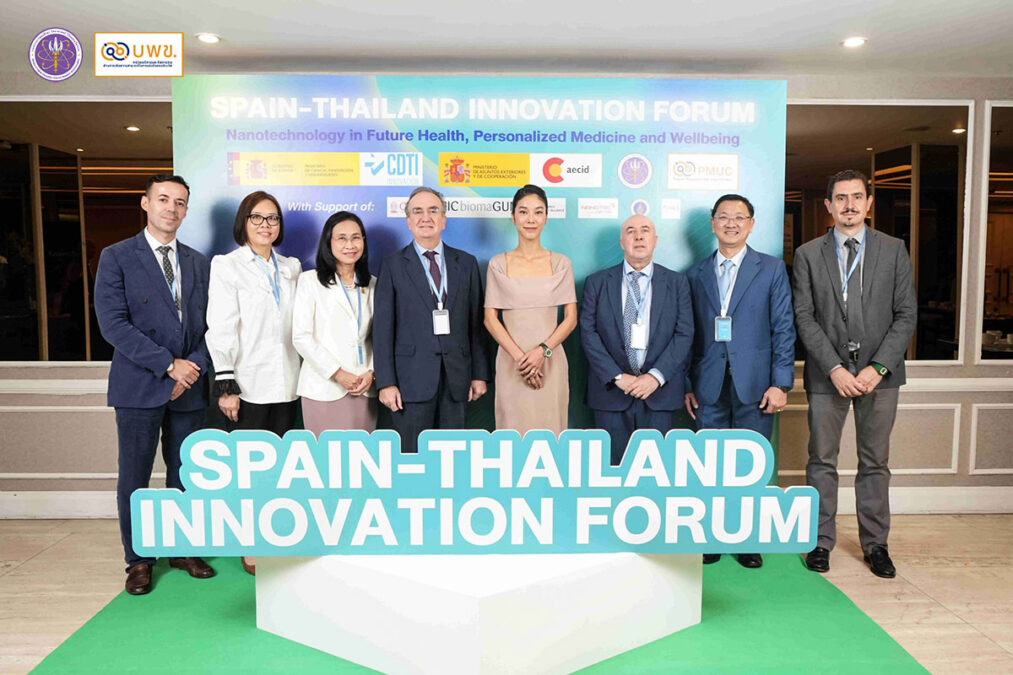
“On this occasion, a delegation of 11 representatives from Spain, all of whom are experts with experience in various fields—ranging from nanoscale disease diagnostics, biomedical nanomaterials, nanodrug delivery, to the use of nanoparticles for effective disease diagnosis and treatment—participated in this conference. Their presence was facilitated by the Embassy of Spain in Thailand and the CDTI, the national innovation agency of Spain.”
“Additionally, leading Spanish companies specializing in technology platform design and biotechnology and nanotechnology have come to exchange knowledge and discussions, which can further lead to business collaborations with Thai technology companies.”
“Working together between agencies like PMUC and CDTI, which oversee the continuation, development, and enhancement of research, innovation, and technology, to boost the competitiveness of entrepreneurs is a significant step in building Thai-Spanish relations, supporting mutual knowledge exchange. This collaboration will yield sustainable development outcomes, and ‘continuity’ is the key to achieving concrete benefits for the development of both countries.”
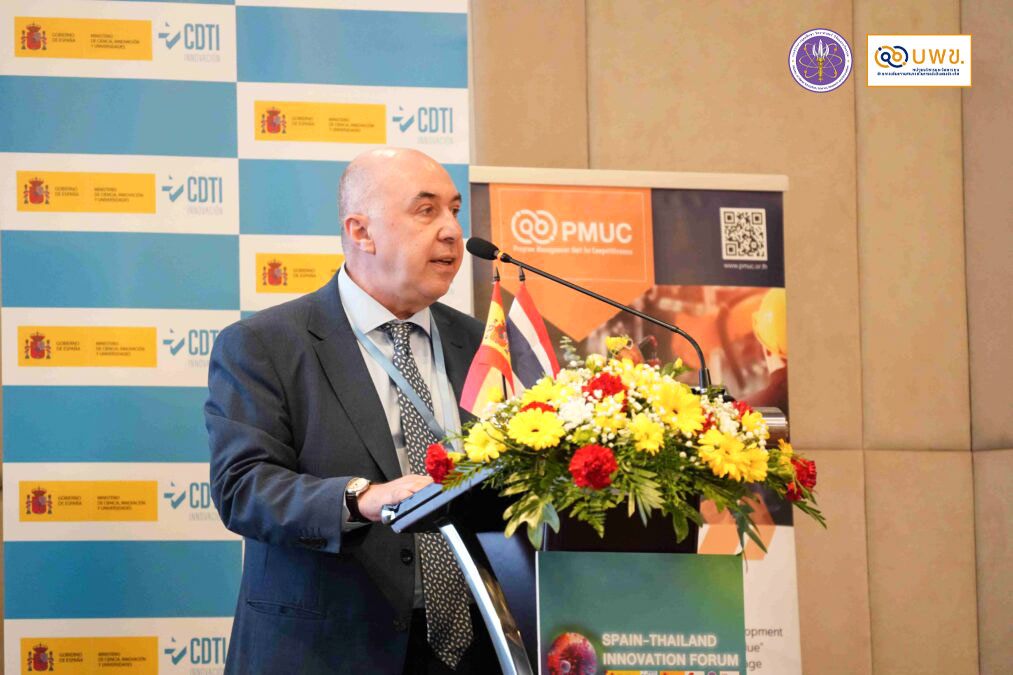
Carlos de la Cruz, Director of CDTI.
Mr. Carlos de la Cruz, Director of CDTI, highlighted the strengths of Spain’s medical and healthcare technology sector, as well as the robust network of entrepreneurs that CDTI supports in Spain:
“CDTI, or the Centre for the Development of Industrial Technology, is an organization that provides both investment for business creation and funding for research and development to over 13,000 Spanish companies, with a total value of more than 16.3 billion euros. Having been established for 40 years, these strengths of CDTI will help promote and create opportunities for Thai entrepreneurs in the medical and health industries related to nanotechnology.”
“In addition, CDTI has set up Business Financing Programs through agreements with agencies and institutions in 29 countries worldwide. This support has contributed to more than 61 innovation and technology projects in 2023, of which 10 percent was allocated to the Asia-Pacific region, with the total funding amounting to over 10 million US dollars. Thailand is one of the latest countries with which CDTI has entered into a concrete bilateral cooperation agreement, and we continue to collaborate closely.”
“Therefore, with the cooperation between CDTI and PMUC, along with research centers, institutions, universities, and the private sectors in both Thailand and Spain, there will be an extensive exchange of knowledge and technology. This partnership provides an opportunity for both countries to progress together in the fields of science, new market exploration, and the co-development of new products.”
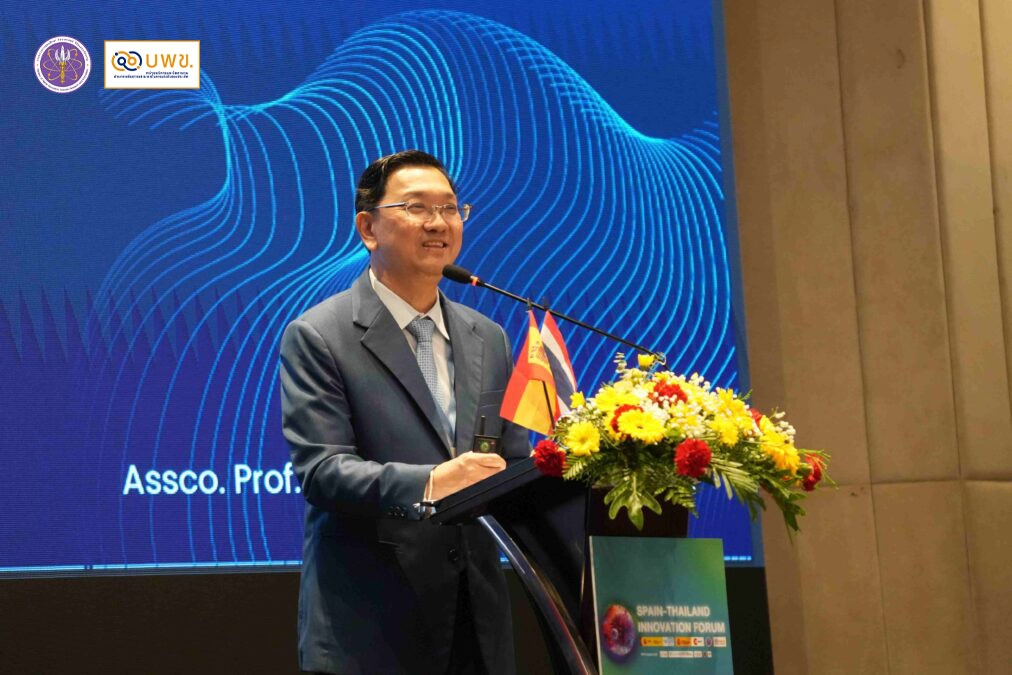
Associate Professor Thongchai Suwansichon, Ph.D., Director of PMUC.
PMUC ready to extend Thai-Spanish cooperation, elevating research and innovation in nanotechnology for practical applications and real value creation.
Associate Professor Thongchai Suwansichon, Ph.D., Director of PMUC, provided additional information on the cooperation between PMUC and CDTI:
“After PMUC and CDTI signed the cooperation agreement on the New Health Rice Variety Development Project in November 2023, there has been continued progress in joint research collaboration between Thailand and Spain. For instance, the Rice Science Center at Kasetsart University, the Spanish company COPSEMAR, and the ICTAN/CSIC Research Institute have been jointly exploring new technologies in various fields, such as drug discovery from natural products, clean technology, and health technology.”
“Meanwhile, universities in Thailand, such as Chulalongkorn University, have expanded research and industrial collaboration with Spain in the fields of medical nanotechnology and food safety.”
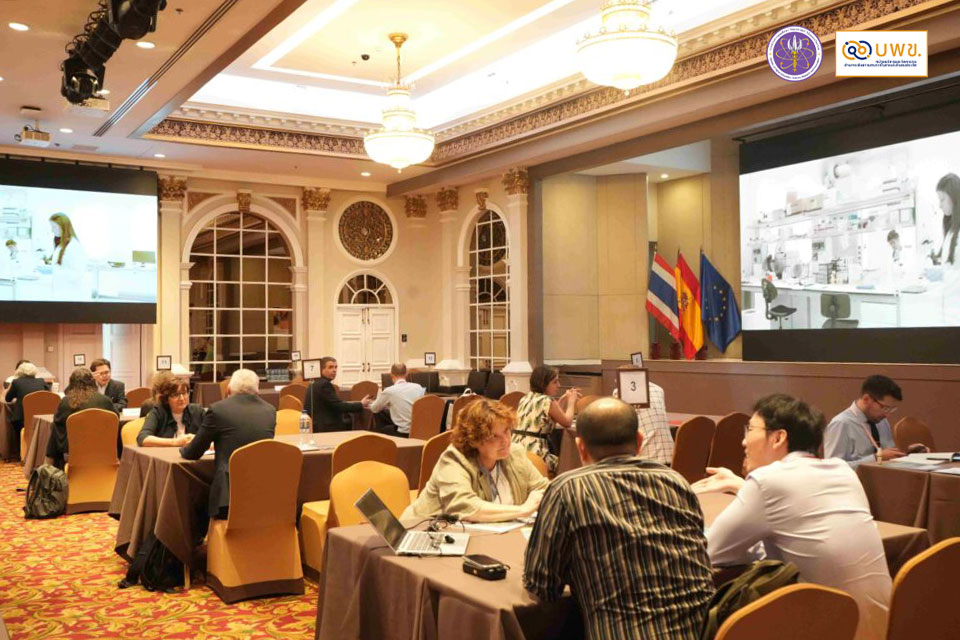
“It is also noteworthy that, within less than seven months, Thailand and Spain have successfully organized two high-level innovation conferences to address global challenges in areas where both countries have technological and business strengths. These areas include sustainable and healthy food production systems, and more recently, the health sector, focusing on the application of nanotechnology for health, personalized medicine, and future well-being. Both conferences successfully attracted delegations from Spain with expertise in research and development, as well as more than 100 experts from 10 agencies under Thailand’s Ministry of Higher Education, Science, Research, and Innovation (MHESI).”
“Today marks another significant step for Thailand and Spain to move forward together. In this collaboration between PMUC and CDTI, we are placing special emphasis on health and medical nanotechnology development, which will be a crucial foundation for creating opportunities for the healthcare and medical industries. This will help drive Thailand to become a sustainable global leader in this market.”
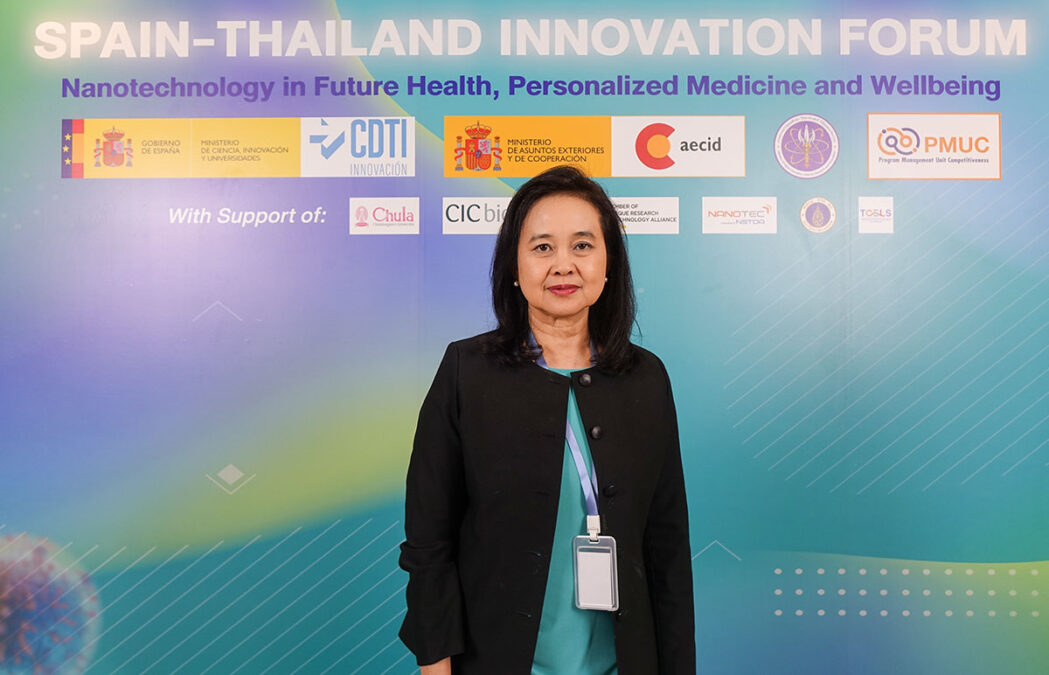
Professor Sansanee Chaiyaroj, Ph.D., Chair of the Subcommittee on Health and Medical Programs under PMUC.
Professor Sansanee Chaiyaroj, Ph.D., Chair of the Subcommittee on Health and Medical Programs under PMUC, spoke about the key missions of the Health and Medical Programs and the collaboration between Thailand and Spain to further develop research into commercial applications:
“PMUC was established during the tenure of Dr. Suvit Maesincee as Minister of Higher Education, Science, Research, and Innovation, with a clear objective to leverage research with commercial potential by providing funding support to enhance the competitiveness of products. Researchers must already have a prototype developed in the laboratory or possess proof of concept, which involves testing the feasibility or ‘feasibility analysis’ to determine whether it can be adapted for commercial production or developed into a product.”
“The funding support from PMUC has specific criteria, focusing on the business model, market opportunity, and considering the TRL (Technology Readiness Level). The research must have reached at least TRL4. In the health and medical research programs, the aim is to support research to advance up to TRL6.”
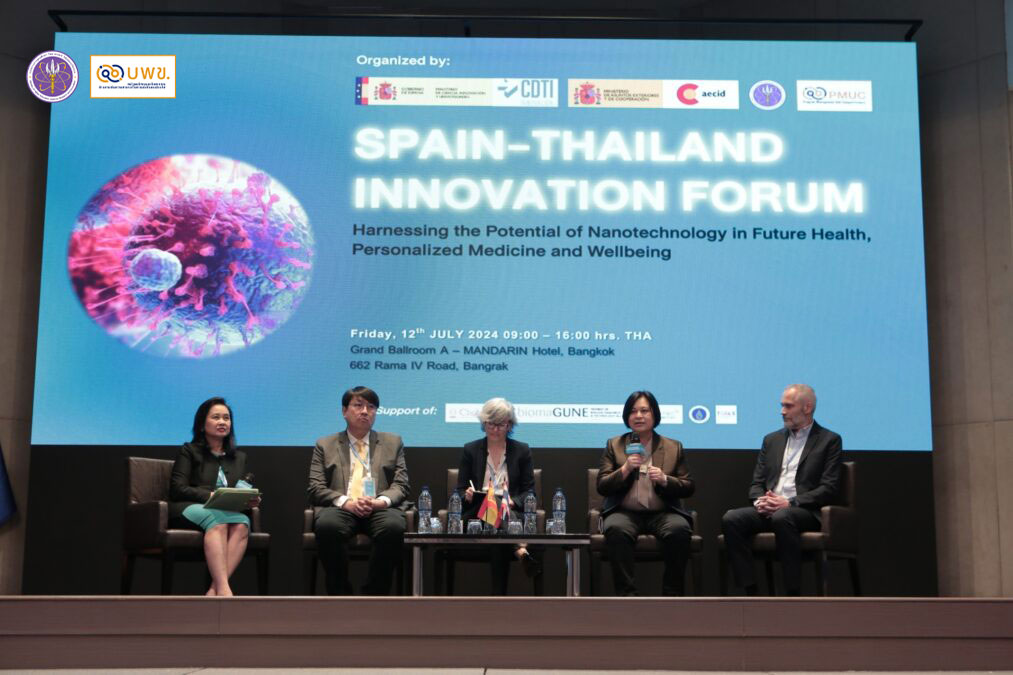
“TRL4 refers to testing on animal models to ensure non-toxicity and safety, while TRL5 and TRL6 involve conducting clinical trials in Phase 1 and Phase 2, respectively. In Phase 1, startup companies or SMEs should receive funding to assist them in conducting Phase 1 clinical trials. By Phase 2, the company must co-invest, as the value and scale of the project increase.”
“The primary reason why PMUC initiated the Health and Medical Programs is to support health and medical research to ensure Thailand’s national security through advancing reliable research with international standards. For example, during the COVID-19 crisis, we funded the Department of Medical Sciences and Siam Bioscience Co., Ltd. to produce diagnostic kits for COVID-19 testing, which have been recognized as meeting international standards.”
“Today’s collaboration arose from efforts to identify stakeholders who can work together in the context of Thai-Spanish cooperation, including researchers and companies from both countries, who can seek funding support either from CDTI (Center for the Development of Industrial Technology) or PMUC to drive joint projects. Key issues to be addressed include intellectual property laws and cooperation agreements, such as licensing agreements, allowing companies to further develop the research or license the innovations. Therefore, PMUC’s role is not limited to providing funding but also facilitating and acting as a bridge between all parties.”

“Today, Thai researchers come from universities and research institutions focusing on medical nanotechnology, such as Chulalongkorn University, Mahidol University, and regional universities like Naresuan University and University of Phayao. There are also spin-off companies, SMEs, and startups that produce Thai products or innovations utilizing nanotechnology, which are prominent and have been recognized globally.”
“We are pleased to expand our research collaboration with Spain, as Spain excels in adapting nanotechnology to create medical innovations, platforms, and services. Moreover, Spain has invested heavily in nanotechnology, ranking among the top investors in the European region. After the COVID-19 crisis subsided, Spain strategically planned to support its research sector and attract more researchers from other European countries by creating a conducive living environment, given that Spain already has a relatively low cost of living compared to other countries in the region, delicious food, pleasant climate, and beautiful landscapes.”
“All of these points should serve as a model for Thailand, highlighting the importance of having a national strategy that emphasizes innovation and technology development, which will sustainably attract investment to the country.”

